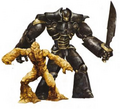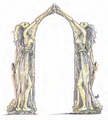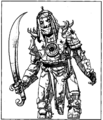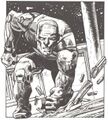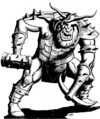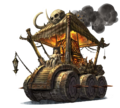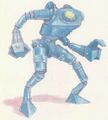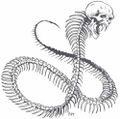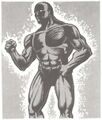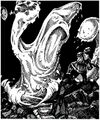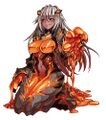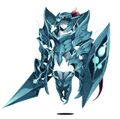Golem: Difference between revisions
1d4chan>Nubnuber No edit summary |
1d4chan>Nubnuber No edit summary |
||
| Line 243: | Line 243: | ||
obsidian figurine MCR3.png | obsidian figurine MCR3.png | ||
porcelain figurine MCR3.png | porcelain figurine MCR3.png | ||
figurine DoDread.jpg | |||
</gallery> | </gallery> | ||
* '''Furnace Golem''': A variant iron golem that is created to serve as a secondary [[spelljammer]] helm. | * '''Furnace Golem''': A variant iron golem that is created to serve as a secondary [[spelljammer]] helm. | ||
Revision as of 17:09, 2 January 2022

A golem (גולם) is a creature from Jewish mythology. It is an animated humanoid made from inanimate material (typically clay) brought to life by holy words by rabbis who, through their piety, gain some of God's power and knowledge, including some of that which he used to make Adam. Almost inevitably in the myths, this involved inscribing certain Hebrew words in clay upon its forehead - usually the four letters of the shem (שֵׁם, the tetragrammaton, i.e. the secret name of God that is forbidden to be pronounced). One particularly interesting tale has the rabbi write 'אמת, truth, on a golem that then goes berserk, but is then rendered inert by the erasure of one letter yielding מת, death.
Purposes for making a golem include general labor; labour in hostile conditions; defending treasures, places, and tombs; and killing the fuck out of goyim. This tends not to go so well for their creators, though; hubris is perhaps the ultimate theme in these stories, with the occasional added motif of the golem being available to help the rabbi and his people again should they be in need.
So, robots before Karel Čapek thought up the word and servile zombies before the Haitians, let alone Mary Shelley, thought up the concept. Artificial entities created for servile purposes, whose level of sapience varies and whose possession of a soul is a topic of frequent debate due to their non-biological nature, and who either A) mindlessly follow the orders of their masters to the letter rather than the spirit, B) go on a berserk rampage and rebel against their creators out of spite, or C) both. None of this was lost on Isaac Asimov who did the most to bring these themes from Judaism into modern robot lore.
Comparable myths about animated statues can be found in other places; for example the Greek God Hephaestus creating gold and silver maidens to help him out, being crippled and everything (and also to have sex with because his wife was Aphrodite and naturally fucked everyone but him). The word "Golem" has become a catch all term for such things. The idea of artificial people is thus very ancient, and the fear of their rebellion may originally just be an extension of the general fear of slave revolts.
Dungeons and Dragons
In D&D, Golems are mid-tier enemies that are treated sort of like man-made elementals, with each type being made purely out of only one substance. There's about as many kinds of Golem as there are things out of which you could potentially make them, from quasi-robot Steel Golems to quasi-Frankenstein's Monster Flesh Golems. You could even use clay, if you're the kind of person whose pet tortoises die of boredom, though they do have some unique abilities. (Chiefly, hasting themselves and having a chance of going berserk.)
They tend to have lots of raw strength and hit points, on top of high damage reduction and magic resistance (or even immunity) as a racial trait. Some of the more-exotic types have magical powers. Warforged are the closest thing to a PC variant golems possess, and even then they're really a grey area between golem and straight-up robot... unless you play Third Edition, in which case you can play as a Maug, a Zelekhut Inevitable, or any of the other honest-to-god nonliving constructs that WotC had the balls to give level adjustments and favored classes for use as player characters.
Ravenloft adds the added wrinkle of "dread golems"; while they may look and act like regular golems at first glance, the Dark Powers have used the obsessiveness of their crafters (who may not even know what they're making- all they need is a strong enough desire to create a thinking being) to make them truly sentient, rather than being unthinking automata. Unfortunately, the Dark Powers' "gift" also makes dread golems extremely malicious by nature, and most if not all of them will eventually attempt to murder their creators.
Material Golems
You might think that golems get pretty old, pretty quick, but they come in a massive array of forms, abilities and levels. And we mean massive; check out this list!
- Adamantine
- Amber: A Mystaran golem, typically fashioned in the form of a great cat. Appeared in Advanced Dungeons & Dragons.
- Ash: Native to Dark Sun, creating these golems requires a whole lotta ash, the blood from an Athasian fire drake, and the spells wish, burning hands, polymorph any object, and geas. They can burn whatever is in their touch, hurl fireballs, and emit clouds of caustic ash.
- Brain: Created by illithids and widely regarded as one of the stupidest possible golems for that choice. The key component is a chunk of neural tissue from an Elder Brain, and these golems are treated as the most useful and valuable slaves in an illithid community.
- Bone: A golem fashioned from bones taken from felled skeletal undead. May have debuted as part of the Ravenloft setting, but has quickly become a generic D&D staple.
- Clay: One of the most iconic golems of all time, as this is the actual mythical golem. In old-school D&D parlance, this was actually considered a "lesser" golem, like the Flesh Golem.
- Chitin: Native to Dark Sun, creating these bug-flesh golems requires a sufficient supply of chitin or giant bug carcasses (kanks are favored for how common they are), which need to be painted in a mixture of Athasian earth drake blood and the juices squeezed from potion fruits for animal control and vitality. Then the caster hits the mess with the spells animate dead, geas, polymorph other, and wish, and bang, you got a Chitin Golem. Only defilers can create this golem type in AD&D. They're impervious to spells of 5th level or lower, as well as to all necromancy spells, and they wield toxic claws to rip people apart.
- Flesh: Basically Frankenstein's Monster. They got their own page.
- Fungus: One of a collection of "lesser" golems featured in Dragon Magazine #341.
- Garbage: One of a collection of "lesser" golems featured in Dragon Magazine #341.
- Gemstone: Native to the Forgotten Realms and were created in ancient Mulhorand. They come in Ruby, Emerald and Diamond flavors and escalating toughness in that order. In modern times, or at least AD&D, they are only seen in Thay, and only the Zulkir of Evocation knows how to make them.
- Glass: Renowned for its beauty, often incorporated into stained glass features.
- Hellfire
- Iron: Traditionally the strongest, nastiest of the Big 3: clay, stone and iron.
- Lightning: A Forgotten Realms creation, a golden mannequin bristling with powerful electrical energies.
- Maggot: Ever wondered how you can make the Flesh Golem more disgusting? Meet the Maggot Golem, which looks and smells exactly how you're picturing it. This guy showed up in Ravenloft, and its creator actually became a demilord during that brief period of time when Azalin was deposed.
- Magic: A golem that began appearing in the Forgotten Realms after the Time of Troubles, created by somehow fusing a human soul to a Wild Magic zone to create a mindlessly obedient creature of pure magical energies as the ultimate "fuck you spellcasters" servant.
- Magma: One of the most powerful golems native to Dark Sun, created by the Athasian Dragon.
- Mist: Native to Ravenloft, and less a golem and more a magic-spawned hateful doppelganger of a wizard whose experiments in creating golems goes awry.
- Mithral
- Mud: Basically a soggier, grosser cousin to the Clay Golem, native to Mystara.
- Obsidian: A powerful golem native to Dark Sun.
- Paper: One of a collection of "lesser" golems featured in Dragon Magazine #341.
- Rock: You might be thinking "isn't that the same as stone?" Well, yeah. Like the Skeletal Golem, this is basically the Mystaran version of a golem seen elsewhere in the multiverse, and it's largely identical, save for some fiddly little details.
- Salt: One of the weaker Dark Sun golems.
- Sand: Native to Dark Sun.
- Silver: A metallic golem native to Mystara made of silver and filled with quicksilver (mercury), which somehow makes it incredibly fast.
- Skeletal: The Mystaran version of a bone golem, characterized by having four arms and so being able to make more attacks.
- Snow: Native to Ravenloft. A 5e version appeared in the Rime of the Frostmaiden module.
- Stone: Traditionally one of the strongest of all the common golems, second only to the Iron Golem.
- Tin: One of a collection of "lesser" golems featured in Dragon Magazine #341.
- Wax: There's two different kinds of wax golems in D&D. The first is a shapeshifting golem that originally debuted in AD&D for Ravenloft. The second is a "lesser" golem, which was part of an article full of the things in Dragon Magazine #341.
- Wood: Once again there are two kinds. One native to Dark Sun and the other one of a collection of "lesser" golems featured in Dragon Magazine #341.
-
-
Wood, Tin and Wax
Specialized Golems
Oh, and if the generic material-based golems of AD&D aren't enough, it also featured specialized types of golem, too:
- Autognome: A clockpunk automaton built by the tinker gnomes of Spelljammer with a penchant for malfunctioning.
- Blood Golem of Hextor: A golem made of the blood of sacrificial victims, clad in magical armor and wielding flails. Because it is constantly leaking blood it must replenish itself regularly by draining it from recently killed corpses.
- Brass Minotaur: A powerful vengeance implement, consisting of a minotaur skeleton bathed in brass to create a sculpture that is then animated.
- Bog Hound: Dog constructs made from the rotting plant matter of a swamp.
- Burning Man: A crude golem made of burning coal.
- Caryatid Column: A stone golem designed to resemble a statue of a beautiful woman being used as a support column, but which can step out of its column to battle intruders.
- Carrionette: A relative to the Doll Golem native to the Ravenloft domain of Odiare, made from a marionette. Capable of stealing a person's body by stabbing them with a magic needle, leaving the victim's mind trapped in the marionette.
- Clockwork Eunuch: An enchanted clockwork golem used to guard harems in Al-Qadim, and thus designed to resemble the stereotypical big fat turban-wearing eunuch harem guard. Somehow incredibly skilled at grappling things despite having big-ass scimitars in lieu of hands.
- Clockwork Swordsman: A Mystaran invention that is nearly indistinguishable from a human.
- Clockwork Warrior: A dwarven-made metal behemoth.
- Copper Automaton: enchanted clockwork soldiers of copper and brass native to Al-Qadim.
- Doll Golem: An animated doll.
- Drolem: A Flesh Golem built out of dragon parts.
- Figurine Golem: A malicious miniature golem that disguises itself as a Figurine of Wondrous Power, native to Ravenloft. There are many different varieties, made from various different materials; ceramic, crystal, diamond, ivory, obsidian (jagged or smoothed, each is its own variant), and porcelain.
- Furnace Golem: A variant iron golem that is created to serve as a secondary spelljammer helm.
- Gargoyle Golem: A stone golem designed to replicate a gargoyle, which somehow gives it a petrifying touch. Also has an Iron Gargoyle Golem variant, which is only found in Mystara.
- Gloom Golem: Made out of clay dredged from the river Styx in Hades.
- Guardian Warrior: Mystaran ceramic construct resembling a horse and rider.
- Half-Golem: The product of an experiment gone wrong (2e) or people who have received prosthetic golem limbs (3e).
- Hammer Golem: A dwarf-made golem with a hammer and pickaxe for hands.
- Juggernaut: A giant stone golem that runs about on stone rollers, crushing anything in its way.
- Living Statue: Native to Mystara. Comes in crystal, iron, jade, rock, ooze, silver and steel
- Mechanical Golem: A
robotmass of vicious machinery given clumsy life as a golem, native to Ravenloft.
- Mek: A Mystaran
robotgolem of unknown origins with an insectoid appearance.
- Metagolem: A
straight-up freaking robotsapient golem made of metal with intricate mechanical innards.
- Naàruk: A 10-foot tall winged bull composed of bronze, created by the enduk of Mystara as a magical flying troop transport.
- Necrophidius: A bone golem mockery of a naga, comprised of a fanged humanoid skull atop the skeleton of a giant snake. So-called because "Bone snake" would've never made it past the editors.
- Radiant Golem: A rare and powerful golem that sheds a magical death aura, implied to be made out of radioactive material.
- Scarecrow: An animated scarecrow; what did you think it was?
- Shaboath Golem: A golem constructed from magically animated water by aboleths.
- Spiderstone: A drow-crafted golem consisting of obsidian magically worked into a four-armed drow.
- Stone Guardian: A giant stone golem used as a temple guardian.
- Temple Critter: 1-foot tall golems made by priests to maintain and defend temples.
- Zombie Golem: A Flesh Golem made from rotting, dead bodies infused with necromancy.
Pathfinder
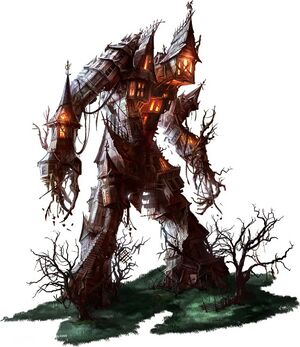
Pathfinder follows in the tradition of D&D with a stupidly huge array of golems made from different materials and types. It even introduced the idea of Colossi, incredibly huge and powerful golems made only by true masters of magic.
The current list of Pathfinder golems stands at:
- Adamantine
- Alchemical
- Behemoth
- Blood
- Bone
- Brass
- Cannon
- Carrion
- Caryatid
- Clay
- Clockwork
- Coral
- Crystal
- Flagstone
- Flesh
- Fossil
- Furnace
- Gelatinous
- Glass
- Gold
- Ice
- Iron (with Iron Archer and Iron Maiden variants)
- Junk
- Lead
- Magnesium
- Marrowstone
- Mask
- Mithral
- Mummy
- Noqual
- Obsidian
- Ooze
- Quantium
- Quintessence
- Robot
- Rope
- Stone (with Stone Guardian variant)
- Tallow
- Viridum
- Wax
- Witch-Doll
- Wood
Monstergirls
 | This article or section is about Monstergirls (or a monster that is frequently depicted as a Monstergirl), something that /tg/ widely considers to be the purest form of awesome. Expect PROMOTIONS! and /d/elight in equal measure, often with drawfaggotry or writefaggotry to match. |
Golems enjoy some popularity as monstergirls. Because of their hard bodies they are lacking in the physical department: no hugging, no kissing and no sex. Handjobs are technically an option, but given the often hard and cold materials golem girls are made of they tend to be uncomfortable at best. Despite (or because of) this they often desperately want to feel and touch their lovers, with romantic streaks being common. On the other hand, somewhat cold and aloof personalities also appear amongst them. Actually permanently turning a golem girl into something fleshy is out of the question, because that would defeat the entire point of a golem girl. But the science/magic that made them also proves the answer. By linking something like a fleshlight into her body the girl can feel and have sex, even if it is somewhat uncomfortable. Aside from the shenanigans that come from a golem girl being quite heavy for her size (being made out of stone or metal and all), there is one tragic element to them. Because of their nature a golem can live forever if they're not destroyed. As such they're very likely to greatly outlive their lovers, which sometimes has them stand over their lovers' graves unmoving for a long time to come.
Because of the close relationship between the Golem and other "Construct type" monsters, such as Animated Objects and Tsukumogami, monstergirls based on other forms of construct are often considered golem-girls as well.
Needless to say, golems appear in the Monster Girl Encyclopedia. Aside from the stone-based, rune-powered "common" Golem, there's also the more mechanical Automaton, the slime-like Lava Golem, the Gargoyle and the Skeleton, a necromancer's equivalent to a golem. The setting's equivalent of the Construct Type is the "Magic Materials" type, which makes the Golem relative to the Cursed Sword, Living Armor, Living Doll, Gargoyle and the Tsukumogami mamono.
-
A Golem
-
A Lava Golem
-
An Automaton
-
-
-
-
-
-
-












